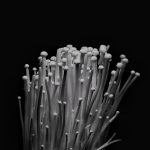In recent years, the trend to buy natural products that have beneficial health properties has increased considerably. Natural medicine has been making its way into the homes of many families, not to replace traditional medicine, but rather to complement it. Ginseng, for example, is a root of Asian origin that has been used for hundreds of thousands of years in traditional Chinese medicine for its many medicinal properties. Today we invite you to discover it.
What is ginseng?
Ginseng is a slow-growing perennial plant belonging to the genus Panax, of the Araliaceae family. In some regions of Asia and China, it is also known as “Ginnsuu”. Depending on the time of cultivation, it can be classified into three types: white, fresh or red. The fresh variety is harvested before the age of 4 years, white ginseng is harvested between 4 and 6 years, and red ginseng is harvested after 6 years.
The term ginseng is derived from the Chinese “rénshēn”. Rén means “person”, while shēn means “root of the plant”. The reason for choosing this name is that the plant seems to resemble the silhouette of a person, as the lower part of the root forks into two legs. Its use in natural medicine is related to the effects it has on the body: it is believed to increase energy, stimulate the immune system and help control certain health conditions.
Ginseng is a stimulating alternative rich in vitamin B, iron, zinc and many other minerals. It also contains natural compounds known as ginsenosides that give it revitalising properties, which account for many of its benefits.
Benefits of ginseng
Its antioxidant effect may reduce inflammation. Some studies show that ginsenosides can reduce inflammation and increase the antioxidant capacity of cells.
Increased energy. It may also stimulate physical and mental activity in people who feel tired. In a study of 21 men and 69 women with chronic fatigue, ginseng showed good results.
Increases cognitive function. It may help improve brain functions such as memory, behaviour and mood. What’s more, its components have the potential to treat some cognitive deficits, such as oxidative stress. So, if you find yourself in a long afternoon at work and need to increase your concentration, a ginseng drink could be your best ally.
Helps erectile dysfunction. Ginseng can also be a useful solution for treating erectile dysfunction in men. The compounds it contains protect against oxidative stress in the blood vessels and tissues of the penis and help restore its functions.
It has an immunostimulant action. Red ginseng, in particular, increases and strengthens the body’s defences against disease and infection. In addition, it also helps to restore the mononuclear phagocytic system, which plays a fundamental role in a good immune system.
It prevents and alleviates the effects of cancer. Studies have been published that positively associate the use of ginseng in women who have overcome breast cancer. Some research shows that patients who used ginseng before cancer treatment had a higher survival rate and that after treatment their quality of life increased. Similarly, other studies have also been published showing that fatigue associated with cancer treatments was reduced by the use of ginseng.
When to take it
Ginseng is commonly found in drinks or capsules, but like any herbal supplement or medicine, it can have side effects. Some of the most common are headaches, digestive problems or insomnia.
It is advisable to take ginseng in the morning, as it increases energy and can make it difficult to sleep at night. It is also important to be careful with the dosage, as taking it in very high doses can cause nervousness or excessive excitement.
As we have already explained, ginseng can affect blood pressure, so if you suffer from hypertension it is not recommended that you take it, unless under the supervision of a doctor.
On the other hand, children and pregnant women should also avoid it, as well as diabetics, as ginseng can lower blood glucose levels and this can interact with diabetes medication. Therefore, as in the first case, it is best taken under the supervision of a medical professional.

















